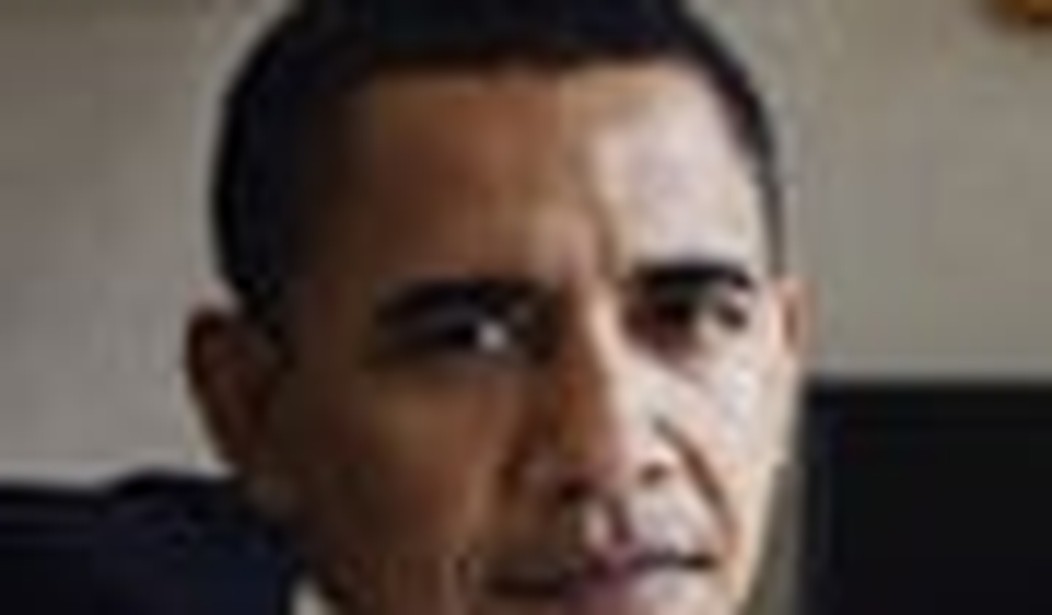Die Welt was once a stolid German newspaper with a habitual bias against leftism and a permanent bias against enthusiasm. Its conservative reserve was no defense against Barack Obama. Die Welt gazed at his manly physique, listened to his honeyed words and dashed off a love letter.
“He shows what can happen if a republic is viewed not as an organizational chart of officials and a producer of party agendas, but as a living and common whole,” it swooned. “Obama’s goal appears to be to awaken ideals and enthusiasm for freedom, to change something and to steer politics onto a new track.”
German has the useful word Tantenverführer: “a young man of excessively good manners you suspect of devious motives (literally, an aunt seducer).” Obama’s determination to “change something” has seduced Europe, although like everyone else Europeans aren’t sure what he wants to change. Instead of hard thought about the future, there’s a tingling glowing feeling that under the leadership of a black politician — and isn’t it wonderful he’s black? — everything beastly about Bush’s America will go, and the United States will turn into an eco-friendly, peace-loving nation, respectful of the views of foreign countries which won’t risk their troops in the war against the Taliban or say a harsh word about Vladimir Putin.
You find the exhilaration everywhere, except Britain.
I don’t want to give a false impression. British journalists and politicians are as interested in Obama as politicians and journalists everywhere. However, although a few have lost their heads, there’s no general mania. Our political class would still like to see Clinton in the White House. Like Hillary, Gordon Brown is a dogged but unexciting politician. He also had to stand back while his charismatic senior partner received the plaudits. If she could triumph after decades of slogging, maybe he could step out of the shadow of Tony Blair and win an election all by himself. (Brown became Labour Prime Minister without the voters going to the polls. I won’t bore you with the details, just remind you that Britain is not a very democratic country.)
The opposition Conservatives would also have few difficulties with a Clinton presidency, indeed several senior figures have “Vote Hilary” posters on their office walls. In Britain as well as elsewhere in Europe, anti-Americanism has been returning to its conservative roots since the fall of the Berlin Wall. Bush’s keenness to spread democracy to undeserving Arabs as much as the disasters of the second Iraq War shocked many Conservatives as greatly as it appalled many on the left. They will be happy when he’s gone.
The Conservatives have also grasped what liberals still don’t understand: Bill Clinton was one of them. His balanced budgets look good to Tory eyes when compared against the deficits of the Bush years, while his attacks on the needy have inspired the Tories to propose bringing his welfare “reforms” to Britain.
From personal experience I can say that black Britons are moved by Obama’s success, but Trevor Phillips, the most prominent black public official and a clear-eyed thinker, warned them that Obama may be “helping to postpone the arrival of a post-racial America and I think he knows it.” The deal with white America runs like this, he argued. Obama promises not to make a fuss about racism and the hundreds of thousands of blacks in jail. Whites are grateful to have their guilt absolved and vote for him. Their support rebounds “to Obama’s political advantage without having any impact on racial inequality.”
The conventional explanation for British indifference is that we already had our fit of the vapors over Tony Blair. The Obama campaign doesn’t object to the comparison, and points out that Blair won three victories before the weariness of voters and the plots of his colleagues forced him out. However, for all the criticism that he was a poll-driven politician, Blair and Obama have little in common. Blair built his political career by confronting the British Labour Party. He defined himself by overturning leftish policies he regarded as unworkable and unpopular. By contrast, Obama does not appear to wish to tell his supporters anything that might disconcert them.
A more convincing explanation to my mind is that European support for Obama is tied to levels of anti-Americanism, and despite all Bush has thrown at them, the British are not as anti-American as the continentals have become.
At a recent meeting in London Reuel Marc Gerecht, a former CIA officer, elegantly calibrated attitudes to the US. He spoke all over North America and Europe and whenever the subject of an aggressive foreign policy came up he asked audiences whether Israel had been right to take out Saddam Hussein’s Osirak nuclear reactor in 1981. In America, virtually everyone was in favor. Whatever their politics, they reasoned that a totalitarian regime was about to get the bomb and, obviously the West should stop it. In Germany, virtually everyone was against — “even the hawks are pacifists,” he said. In France, audiences split 80 per cent against, 20 in favor — “which was good of the 20 per cent considering Chirac had built the reactor in the first place.” In Britain, people divided evenly.
We are a 50-50 country. Neither European nor American. We listen to Obama’s chat-up lines, but he has yet to seduce us.
Nick Cohen is a columnist for the Observer. His latest book, %%AMAZON=0007229690 What’s Left? How Liberals Lost Their Way%% is out in paperback.









Join the conversation as a VIP Member